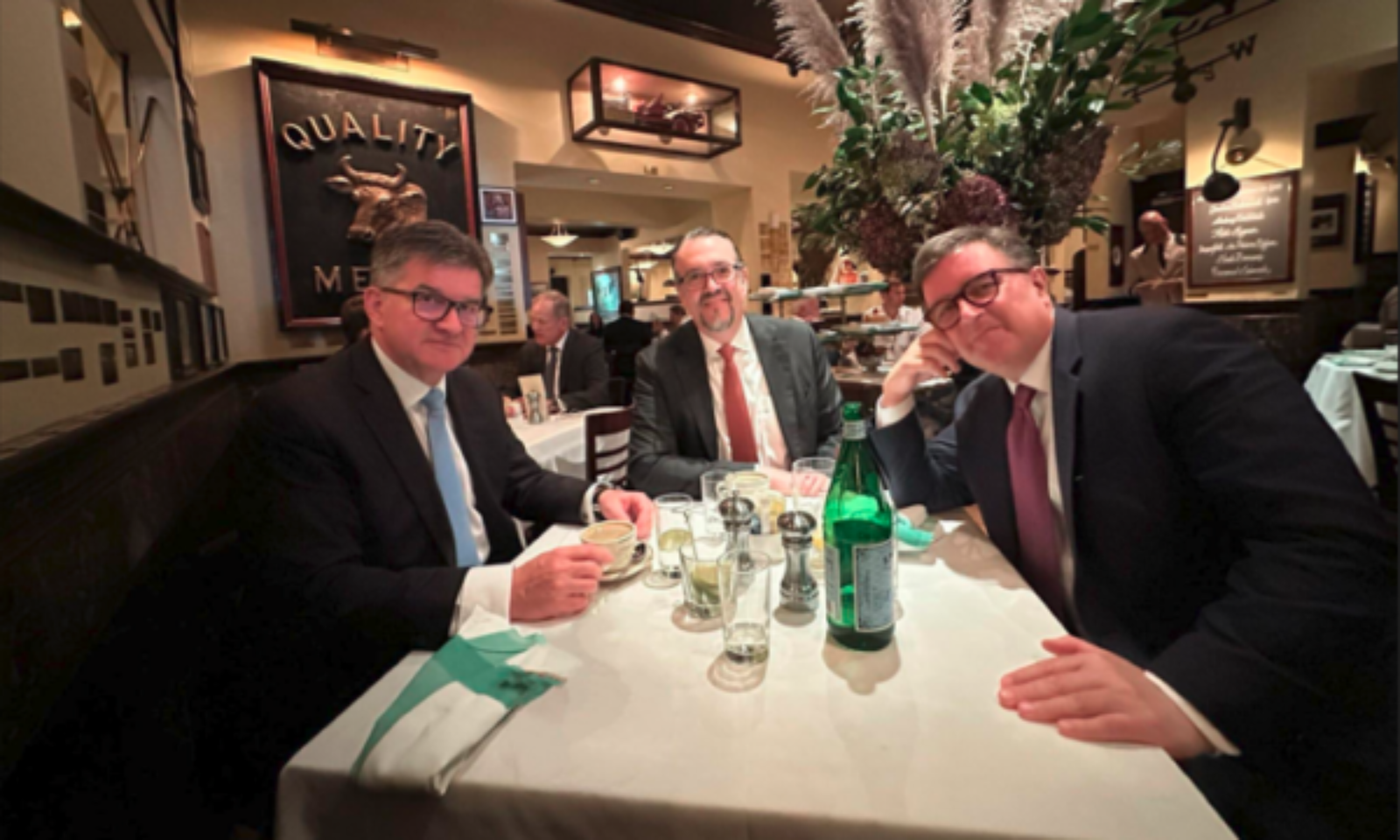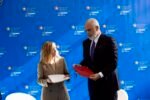European envoy Miroslav Lajčak expects a swift implementation of the Basic Agreement between Kosovo and Serbia, less than a month after stating it was naive to anticipate any progress before the elections in Kosovo. From New York, following meetings with U.S. Assistant Secretary of State Jim O’Brien and U.S. Special Envoy for the Western Balkans Alexander Kasanof, Lajčak appears motivated for substantial progress soon.
He appreciated several ideas from President Vjosa Osmani regarding the agreement’s implementation and agreed with Prime Minister Albin Kurti on the need for “rapid execution,” while also discussing the need for “re-engagement” with Serbian President Aleksandar Vučić. He noted a “strategic discussion” with the Americans, which they plan to continue this week in Brussels.
As his extended mandate approaches its conclusion, Lajčak has shown interest in Osmani’s ideas for implementing the currently stalled Basic Agreement. He met with Osmani on Saturday before returning to Brussels from New York, where both attended the UN General Assembly High-Level Week.
“I valued her thoughts and recommendations on how to implement the Ohrid Agreement,” Lajčak wrote in a post on X (formerly Twitter).
The day before, Lajčak also met with Albin Kurti during a meeting that included O’Brien and Kasanof in New York. Lajčak stated he joined the Americans to discuss the way forward.
“We agreed that there is no alternative to the rapid implementation of the Agreement on the Road to Normalization,” he said.
During discussions with O’Brien, Kasanof, and Lajčak, Kurti reported “productive talks about current developments and the future.”
“Prime Minister Kurti also emphasized his commitment to regional cooperation based on principles of representation and equal participation among Western Balkan countries and reaffirmed the constructive commitment to the normalization process between Kosovo and Serbia according to the Basic Agreement and its Annex, which must be fully implemented,” stated a communication from Kurti’s office.
However, in a post on X regarding this meeting, Kurti reiterated to O’Brien and Lajčak that the agreement needs to be signed.
On the margins of the UN General Assembly, Lajčak also met with Serbian President Vučić, with whom he discussed the “need for re-engagement and implementation of the Ohrid Agreement in light of the EU’s Growth Plan for the region.”
On September 13, while outlining Serbia’s “conditions” in response to actions by the Kosovo government in the north, Vučić reaffirmed his stance in favor of the Ohrid agreement.
“We have no problem with the Ohrid Agreement, and I have spoken about this in the Serbian Assembly. The President of the Republic’s words are binding because they are as important as the written document,” Vučić stated.
He also mentioned having no knowledge of letters from Ana Brnabić expressing reservations about parts of the Ohrid agreement related to Kosovo’s membership in international organizations, saying, “I have no connection to what letters are being referred to.”
In New York, before meeting with Kurti, Lajčak held a separate meeting with the Americans O’Brien and Kasanof, where he emphasized a “strategic discussion about the dialogue for normalizing relations between Kosovo and Serbia” and “regional dynamics.”
“We look forward to continuing our conversation next week in Brussels!” Lajčak announced.
The last discussions between Kosovo and Serbia occurred in Brussels on September 17, at the level of chief negotiators. The implementation of the agreement was one of the topics, but the sequencing of what each party should implement has stalled negotiations. The international community requires Kosovo to approve a draft statute for the Association and submit it to the Constitutional Court, but many view this as impossible due to the February 9 elections and Kurti’s calculations regarding this process.
Kurti’s commitment in Brussels for “constructiveness” and “implementation of all obligations” from the agreement
Before traveling to the U.S., Kurti spent several days in Brussels. On September 20, he met with Gert Jan Koopman, the EU Director-General for Enlargement, where they also discussed the dialogue process between Kosovo and Serbia.
According to the Prime Minister’s Office, Kurti informed Koopman that “the Republic of Kosovo has consistently been a constructive party and is interested in concluding this process.”
“In this regard, the Prime Minister confirmed to the Director his support for the Basic Agreement and the Implementation Plan reached last year,” the statement said.
During that meeting, Kurti committed to implementing all obligations from the Basic Agreement.
The Prime Minister reportedly stated that “Kosovo, with this, reaffirms its commitment to the process of normalizing relations between Kosovo and Serbia and commits to constructive engagement in the process to advance it quickly.”
“In this context, Kosovo commits to fully implement all respective obligations arising from the Basic Agreement for the Road to Normalization and its Implementing Annex, including all previous agreements from the dialogue. The details of implementation will be discussed in dialogue under EU facilitation,” Kurti was quoted as saying.
Regarding Kurti’s statements in Brussels before heading to New York, German Ambassador to Kosovo Jorn Rohde noted that Kurti’s commitment is sufficient for Kosovo to receive payments from the Growth Plan.
He said this is a clear public commitment to continue the dialogue with Serbia in a constructive spirit.
“This is a key step towards the first disbursement under the EU Growth Plan,” Rohde wrote on Friday.
Currently, Kosovo is under EU sanctions due to actions in the north, resulting in frozen funds.
Lajčak’s earlier pessimism
Miroslav Lajčak, while in Prague for the global security forum GLOBSEC 2024, expressed pessimism about the implementation of the Basic Agreement during a panel discussion.
The Slovak diplomat described the agreement as “the best thing,” but emphasized that its implementation “has not even started.”
“President Macron said two days ago in Belgrade that the path is paved, and that path is called the Ohrid Agreement, but what is lacking is political will, and both societies are not ready,” Lajčak declared.
He noted it is naive to believe that implementation could occur before the parliamentary elections on February 9, 2025, in Kosovo.
“We have parliamentary elections in Kosovo in February, so it is naive to think that we can expect progress before the elections. But we must ensure that we see substantial progress in implementation immediately after the elections,” the European envoy stated.
Extended mandate with ‘additional’ powers
After his mandate as envoy for the dialogue was extended until January 2025, Lajčak began his efforts for normalization between Kosovo and Serbia with renewed vigor until the end of his term.
The EU’s Growth Plan is intended to encourage Kosovo and Serbia to move forward with the implementation of the agreement.
This plan foresees a fund of six billion euros for Western Balkan countries from 2024 to 2027 to accelerate the region’s European integration. Access to these funds is conditioned on constructive engagement in dialogue from Kosovo and Serbia.
Lajčak stated that he is the person responsible for assessing progress in the dialogue.
Kosovo stands to benefit from the Growth Plan, with around one billion euros that the government stated would be used for implementing reforms and investment projects.
Lajčak’s mandate as special representative for the dialogue between Kosovo and Serbia, which was originally set to end in the fall, has been extended until January 2025. The head of EU diplomacy, Josep Borrell, appointed the Slovak to this challenging role in 2020.
After four years, the results have not been positive. Relations between the two countries have only worsened, with tensions escalating to violence.
Nevertheless, before leaving this position, Lajčak seems determined to make one last effort for success in his challenging role.
The current U.S. administration is also trying to push for implementation, especially as the state will hold presidential elections on November 5. Any potential changes there could affect the approach to the Kosovo-Serbia dialogue.







